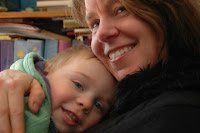 In the mid 90's, I spent almost 3 years battling ongoing fear, anxiety, confusion, panic and depression, all fueled by this overwhelming and constant sense that life was hopeless. I was tired all the time, but couldn't sleep. Life went from a grey to a dark black. I thought about death for a period of 3 months almost every day, and I had no idea when it would end. Maybe you've never experienced something like what I went through. But all of us have experienced something that can be called depression, or at least feels like depression. We lose our appetite. We can't sleep. We feel tired all the time. We want to sleep all the time. We have constant feelings of guilt. We feel worthless. We think about death. For some, depression is an inconvenience. For others, it is a life-dominating numbness that won't go away.*
In the mid 90's, I spent almost 3 years battling ongoing fear, anxiety, confusion, panic and depression, all fueled by this overwhelming and constant sense that life was hopeless. I was tired all the time, but couldn't sleep. Life went from a grey to a dark black. I thought about death for a period of 3 months almost every day, and I had no idea when it would end. Maybe you've never experienced something like what I went through. But all of us have experienced something that can be called depression, or at least feels like depression. We lose our appetite. We can't sleep. We feel tired all the time. We want to sleep all the time. We have constant feelings of guilt. We feel worthless. We think about death. For some, depression is an inconvenience. For others, it is a life-dominating numbness that won't go away.*Depression is caused by many things: personality, brain chemistry, childhood experiences, Satan's attacks, exhaustion, illness, anxiety. But depression is never just physical or emotional. It impacts us as spiritual beings. It affects our relationship with God, our faith, our ability to seek God. It can destroy our joy.
I've never been severely depressed. I've experienced some periods of
despondancy, and post-natal depression, the kind which plunges you into constant drabness and frequent tears, but doesn't require medicine or counselling. I say this so you'll know I'm no expert.
What I say here is from books I've read, talks I've heard, my studies in the Puritans (who excelled in unravelling the physical and spiritual causes of "melancholy"), conversations with friends who suffer from anxiety or depression, or who have supported others who are depressed, and the Bible, especially the Psalms.
We'll talk about three things: strategies for fighting for joy in God when you're depressed; suggestions for supporting others through depression; and resources on depression and the fight for joy. Please add your own suggestions to the comments.
 Fighting for joy when you're depressed.
Fighting for joy when you're depressed.1. Cry out to God, honestly tell him your feelings of abandonment, bewilderment, or anger, and wait patiently for him to restore your joy (
Ps. 41:1; 51:12).
2. Remember that God holds onto you even when you can’t hold onto him (Jn. 10:28).
3. Answer Satan’s accusations - for example, that a real Christian wouldn't feel this way - with the gospel.
4. Confess any unrepentant sin, especially unbelieving patterns of thought, like bitterness or despair. These may be present even if the original source of the depression is physical.
5.
Talk to yourself, instead of allowing yourself to talk to you. Don't let yourself get away with despairing patterns of thinking.
Exhort yourself to hope in God.
6. Replace unhelpful thoughts with helpful ones (Col. 3:2; Phil. 4:8; Heb. 12:3). Memorise the words and promises of God, and speak them to yourself. Think about what God has done, is doing, will do (Psalm 102). Study the Bible or
read about God, even when it’s hard work.
7. Praise and thank God verbally even when you don’t feel it.
8. Read, learn and sing psalms and songs which express discouragement (see hymns below, also Psalm 42-3, 88, 102, etc).
9. Grit your teeth and
do your tasks, one step at a time: get dressed, wipe the bench, write a paragraph of an essay.
10. Depression can be nature's warning sign of over-work, unhelpful patterns of life, or ungodly thinking patterns. It may be time to stop and prayerfully re-assess these things.
11. Shift your gaze outwards. Pray for others. Share the gospel with others. Serve others at cost to yourself.
12. Try to eat well, and get enough exercise and rest.
13. Get outside into God’s world, breathe some fresh air.
14. Find a Christian friend who will stand by you, and speak the words you can’t speak to yourself. I learnt to call a Christian friend as soon as I was feeling down.
15. If depression is severe, counselling may be helpful to give you practical strategies for dealing with depression, and medication may dull the edges so you can deal with the root issues. See your doctor.
 Supporting someone who is depressed
Supporting someone who is depressed1. Love them. Your love might be the only way they are able to experience God's love right now.
2. Don't give up on them. Persevere even when it's hard, and they don't seem to change.
3. Sit with them. You may not be able to do much, and they may not want to talk, but it is comforting for them to know you are there.
4. Listen. Allow them to express anger, bewilderment, despair, doubt, and sadness, even if it makes you uncomfortable. Don't feel like you have to "fix" everything.
5. Read the Bible to them. Pray with them. Speak God's promises, gospel and words to them, when they can't speak them to themselves.
6. You may need to help them take some of the steps above. For example, don't say "Do you want to go for a walk?", but be gently forceful: "Let's go for a walk together!"
7. Give practical help.
As with grief, don't ask "What can I do to help?", just give it: make a meal, clean the house, care for their children.
8. They may not feel able to pick up the phone and call you, even if they need to. Make a regular time to call and visit.
9. Give them structure. A regular weekly visit will help them to keep going until the next one.
10. Set clear boundaries. Don't allow them to become unhelpfully dependent on you. You may need to be available at odd times and in odd places, but you may also need to set limits on times and lengths of conversations.
 ResourcesHymns to learn and sing:Give to the winds thy fearsGod moves in a mysterous way'Twixt gleams of joy and clouds of doubtFor further reading:
ResourcesHymns to learn and sing:Give to the winds thy fearsGod moves in a mysterous way'Twixt gleams of joy and clouds of doubtFor further reading:John Piper
When the Darkness Will Not Lift, which is the last chapter in
When I Don't Desire GodEdward
Welch Depression: A Stubborn Darkness;
and
Blame it on the Brain?;
and his booklet
Depression: The Way Up When You Are Down.
Talks to listen to:Bob
Kauflin The Depressed (the quote at the top is from this talk)
John Piper
Battling the Unbelief of Despondency;
and
Spiritual Depression in the Psalms;
and his biographies of people who suffered from severe depression:
Charles Spurgeon,
William Cowper,
David Brainerd* Quote is from Bob Kauflin The Depressed. My first 15 suggestions owe much to Piper's 15 suggestions in the fight for joy: How Shall We Fight for Joy. Piper explains and expands on these steps in this talk: How to fight for joy, Session 3. Thank you Heather for many of my second 10 suggestions.
images are from stock.xchng
 We've finished our posts on enjoying God. I hope you enjoyed them. If you have any feedback or questions, add them to the comments or contact me.
We've finished our posts on enjoying God. I hope you enjoyed them. If you have any feedback or questions, add them to the comments or contact me.















































